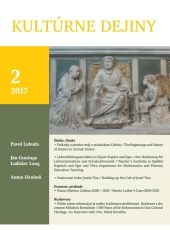Počiatky a povaha vedy v archaickom Grécku
The Beginnings and Nature of Science in Archaic Greece
Author(s): Pavol LabudaSubject(s): History
Published by: VERBUM - vydavateľstvo Katolíckej univerzity v Ružomberku
Keywords: ancient philosophy;science;birth of science;plurality
Summary/Abstract: The aim of the paper is to examine the beginnings and nature of science in the archaic period of ancient Greece. The method of research is historicalphilosophical. It is historical because the interpretation of the birth of science suggested by our approach corresponds with text evidence. And it is philosophical because our reconstruction of the birth of science is able to explain the dynamic nature of the stratification of science. In the first part of the paper we deal with the methodological analysis of the issue of the beginnings of science. In the second part we analyse particular manifestations of ancient investigations that, based on the diversity of their aims and the variety of methods, gradually emancipated to become separate disciplines. In the third part of the paper we argue in favour of the thesis that disciplines emerged from philosophy in such a manner that various disciplines stemmed from the diversity of philosophy. In the conclusion we state that in Archaic Greece of the 6th-5th centuries BC science emerged from the wealth of various research approaches by gradual separation, i.e. stratification of aims and stabilization of research methods. However, not a single science but a number of disciplines appeared. They did not emerge from one philosophy but from the abundance of research approaches and aims. Only later the umbrella term “science” began to be used. The paper focuses on the following issues: under what conditions of ancient Greece, when, why and how did the specific research approach called science emerge? We use a historicalphilosophical method. It is historical because the interpretation of the birth of science suggested by our approach corresponds with text evidence (sources and testimonies). And it is philosophical because our reconstruction of the birth of science is able to explain the dynamic nature of the stratification of science. In the first part of the paper we deal with the methodological analysis of the issue of the beginnings of science, as the question of the origin of any cultural phenomenon (science, philosophy or art) is a comprehensive issue. Without an explicit clarification of how we understand its comprehensiveness confusion could arise in the understanding of our interpretation of the emergence of science. Our ideological assumptions are as follows: ahistoricity of global issues, semantic holism of expressions, plurality of the forms of science and the thesis of the generic affinity of disciplines. We understand philosophy, art and science as the manifestations of human culture. Then, from the historical diversity of cultures and the dynamics of their development it also follows that the expressions like “philosophy”, “art” and “science” are only collective names for a group of manifestations that are always and inevitably connected to a particular culture. So it is true that there is not a single science. There is only a gradual synchronization of the specific manifestations and practices of the certain communities of people. The historian who is led by the idea of the gradual development or crystallization of individual research practices examines the historical manifestations that these practices naturally leave behind. He/she examines the traces of materialised research results (formulated laws, explanatory models or theories). Collingwood called this phenomenon of historical development an „encapsulation of the past in the present”. If this idea proves itself to be true and the past is really encapsulated in the present, the nature and origins of individual disciplines should be traceable back based on the tracking of evolutionary changes of the milestones along the path of its development. Such milestones are basic principles, formulations of laws, mathematical proofs, cosmological models or physical theories that we find during our historical journey from the present back into the past. In the second part we analyse particular manifestations of ancient investigations that, based on the diversity of their aims and the variety of methods, gradually emancipated to become separate disciplines (geometry, cosmology, astronomy, meteorology, physics - acoustics, pneumatics, protochemistry). In the third and final part of the paper we argue in favour of the thesis that disciplines emerged from philosophy in such a manner that various disciplines stemmed from the diversity of philosophy. The meaningfulness of this interpretation of the birth of science is based on three prerequisites. The first prerequisite is that philosophy in the archaic period included a variety of research approaches. What speaks in favour of accepting this condition is, on the one hand, the thematic and methodical variety of the corpus of the preserved fragments and, on the other hand, the vagueness of names for the representatives of various types of archaic thinking. The second prerequisite for our interpretation of the birth of science is that individual disciplines emerged from philosophy by gradual separation by means of the specification of the goal of investigation, stabilization of methods and creation of the specific language of investigation. The proof of meeting this condition is, for instance, Aristotle’s classifcation of the areas of knowledge (epistemai). The third prerequisite on which the meaningfulness of our interpretation of the birth of science is based lies in the fact that there are contemporary reflections of the process of the separation of disciplines from philosophy. In the conclusion we state that in Archaic Greece of the 6th -5th centuries BC science emerged from the wealth of various research approaches by gradual separation, i.e. stratification of aims and stabilization of research methods. However, not a single science but a number of disciplines appeared. They did not emerge from one philosophy but from the abundance of research approaches and aims. Only later the umbrella term “science” began to be used.
Journal: Kultúrne dejiny
- Issue Year: 8/2017
- Issue No: 2
- Page Range: 176-199
- Page Count: 24
- Language: Slovak

